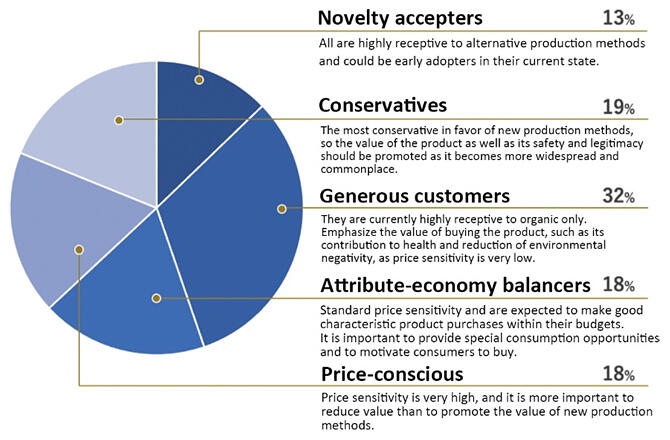In recent years, the livestock industry has been faced with an urgent need to shift to more sustainable production methods from the perspective of environmental impacts and ethical concerns. At the same time, it is important to encourage consumers to choose meat and meat alternatives from each production method. To do this, it is necessary to understand consumer preferences and reactions to different production methods to establish optimal communication with the consumer.
A research group led by Associate Professor Takumi Ohashi of the School of Environment and Society at Tokyo Institute of Technology and Associate Professor Ken‐ichi Takeda of the Faculty of Agriculture at Shinshu University, conducted an online questionnaire among 4,421 Japanese consumers to survey their preferences and receptivity to conventional and alternative production methods (organic meat, animal welfare meat, plant alternative meat and cultured meat) for ground beef. They analyzed the results by dividing the consumer types into five categories: 'Novelty acceptors,' 'Generous customers,' 'Attribute‐economy balancers,' 'Price‐conscious' and 'Conservatives.' They found, among other things, that consumers other than conservatives were more receptive to organic beef than to conventional products. In addition, they also presented specific measures for consumption behavior by identifying differences among consumer types in terms of values, scientific and technological literacy and socio‐demographic attributes.
This study is the first to cover Japan, which has fewer reports than overseas markets, and the first to cover beef and its alternative production methods at the same time. The findings should encourage the acceptance of sustainable production methods in society and a shift towards alternative production methods by promoting consumer value perceptions in marketing practices.

The direction of measures to increase the acceptability of alternative production methods for each consumer type attribute have been summarized. For example, "Generous customers" currently show a high demand for organic only, suggesting that emphasizing values such as health benefits and reduced environmental impact rather than price is required.




